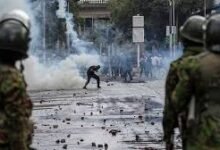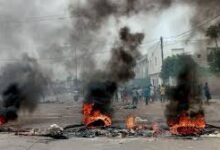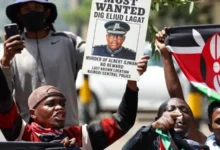‘Sudan revolutionaries offline but not silenced’

In our series of letters from African journalists, Zeinab Mohammed Salih describes what life is like without the internet for Sudan’s revolutionaries.
Many Sudanese are still in shock after the crackdown by security forces, who brutally broke up the crowds at the sit-in, outside the military headquarters on June 3.
The opposition says more than 100 people were killed in the capital, Khartoum, that day – and doctors say 40 of those who died were dumped into the River Nile.
In the wake of the massacre, the internet was shut down by ruling Transitional Military Council (TMC), which said it was necessary in the interests of “national security”.
In the heady days of the mass protests that prompted the military’s ousting of Omar al-Bashir as president, nearly everyone in Khartoum was glued to their phone.
The main body organising the demonstrations – the Sudanese Professionals Association (SPA) – would make its announcement via its Facebook page, which has more than 800,000 followers.
Thousands of people used Twitter and Facebook to galvanise their efforts to demand a return to civilian rule.
Now that the sit-in site – which covered a vast area from the military’s headquarters (HQ) to the campus of University of Khartoum and north to the River Nile – is in ashes, there is an overwhelming feeling of isolation.
Not only are the demonstrators no longer able to gather, but they have found it difficult to communicate and share their disappointment, frustration and anger at the turn of events.
It also leaves them isolated from the rest of the world – and in the days after the crackdown, those in the diaspora were desperate to contact friends and family.
The internet shutdown is costing businesses millions of dollars, according to the local newspapers, something the country can least afford, given that, it was the economic problems that kick-started the protests in December.
For me as a journalist, it has made my working life very difficult. At first, I had to send stories to London via text – and these would not always be delivered.
This was until a friend told me about a hotel in downtown Khartoum with a good landline internet connection. –BBC





